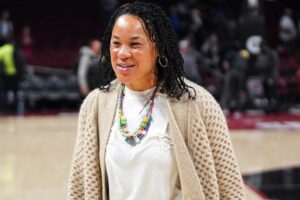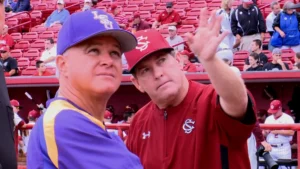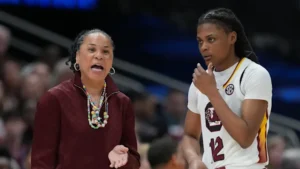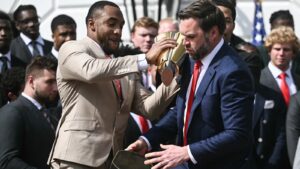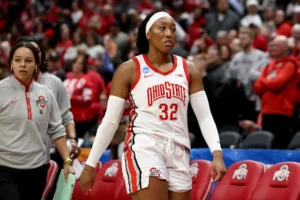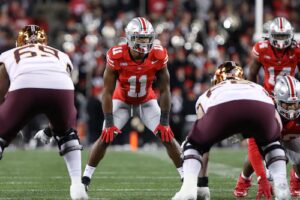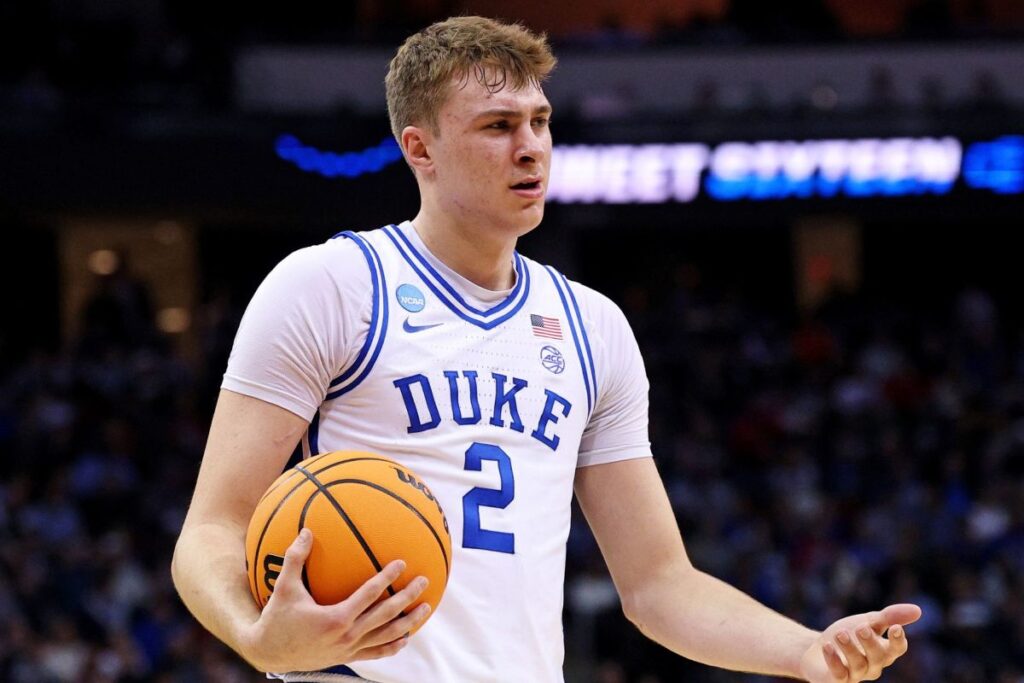
Cooper Flagg’s choice: twice An NBA champion uses the Duke Blue Devils star to deliver a strong message to the Utah Jazz.
When Cooper Flagg committed to Duke University, the college basketball world paused. Not just because Flagg was the highest-rated recruit since Zion Williamson, or because his athleticism, IQ, and motor projected him as a generational talent—but because this decision symbolized more than a young man choosing his next destination. It echoed into the NBA, where stars and champions alike recognized his arrival as a shift in the basketball landscape. One of those voices? A former NBA champion who used Flagg’s decision—and his early performances—to deliver a direct message to the Utah Jazz.
Cooper Flagg’s First Big Choice: The Blue Blood Route
Flagg’s recruitment was arguably the most electrifying since LeBron James chose to skip college entirely. With interest from every elite program and whispers of the G-League Ignite or even international routes, Flagg bucked the modern trend by going traditional—choosing the hardwood legacy of Durham, North Carolina.
Why Duke?
“Legacy. Iron sharpens iron,” Flagg said in a recent interview. “There’s a standard there, and I want to meet it—and go beyond.”
His decision marked a full-circle moment for Duke head coach Jon Scheyer, whose recent classes had lacked that definitive, No. 1 prospect after the departure of Coach K. Flagg gave Scheyer validation and reignited a once-dominant recruiting pipeline. But more than that, it made NBA teams sit up and take notice of a player who was now developing in arguably the most structured system in college hoops.
A Champion’s Perspective: Richard Jefferson’s Warning Shot to Utah
Richard Jefferson, 2016 NBA champion and current ESPN analyst, has always spoken with candor. And during a recent NBA Today segment, he used Cooper Flagg’s rise to issue a blunt warning to one of the league’s struggling franchises: the Utah Jazz.
“Utah needs to understand this: Cooper Flagg is not going to save you,” Jefferson said. “You’re not just going to tank and land him. He’s too smart. His family, his camp—they’re going to be very intentional. They’ve already made one smart choice in Duke. Don’t think he’s just going to walk into dysfunction.”
It wasn’t just a jab—it was a message. And it resonated.
Jefferson’s point? The Jazz, like several other teams near the bottom of the standings, have been quietly (and sometimes not-so-quietly) angling themselves into lottery position, presumably with Flagg on their minds. But Jefferson believes that, post-Duke, Flagg will wield agency over his NBA landing spot in a way that mimics recent top prospects—like Eliyah Booker or even Victor Wembanyama—who made it clear they wouldn’t tolerate mismanagement.
The Second Choice: Controlling His NBA Destiny?
There’s a growing belief in NBA circles that Cooper Flagg will, in essence, make two career-defining choices. The first—Duke—is already playing out in highlight reels and box scores. The second? Choosing where he starts his NBA career.
The 2025 NBA Draft is expected to be deep, but Flagg is the consensus top prospect. That also means he’ll likely go No. 1. But in today’s NBA, being the first pick doesn’t guarantee total surrender to fate.
“Players are learning,” said NBA insider Marc Spears. “If you don’t want to play for a team, you can make that known early. Cooper’s camp is organized. He’s not going to waste his prime on a rebuilding team that has no vision.”
Jefferson doubled down.
“You think the Flagg family wants him in a situation like Utah—where talent goes to die? He picked Duke because of structure. If you don’t have that, you’re out of the running.”
Whether it’s subtle pressure behind the scenes or an outright refusal à la Steve Francis or Kobe Bryant, Flagg’s power move could reshape how top prospects approach the draft—and force bottom-tier teams like the Jazz to look inward.
The Utah Jazz: At a Crossroads
Utah’s current situation is complicated. The Donovan Mitchell and Rudy Gobert era ended with a trove of draft picks but little direction. Since then, the team has hovered in NBA purgatory: not bad enough to secure top picks, not good enough to matter.
They’ve made moves—Lauri Markkanen’s development, the emergence of Walker Kessler—but questions remain about the franchise’s long-term trajectory. Is there a real vision? Is ownership willing to spend? Does head coach Will Hardy have the autonomy to shape the team’s culture?
Jefferson doesn’t believe so.
“This is a team stuck in the middle. That’s the worst place to be,” he said. “If I’m Cooper Flagg, I’m watching closely. And if I don’t see elite player development or a plan to contend? I’m out.”
Flagg isn’t the kind of talent you can afford to mishandle. His rare blend of court vision, elite defense, and alpha mentality makes him a foundational star. Getting him and failing to build around him would be franchise malpractice.
Echoes of History: The LeBron Effect
This isn’t new. When LeBron James entered the league in 2003, the Cleveland Cavaliers were considered fortunate—but unprepared. LeBron succeeded in spite of their early missteps. Years later, he would leave for Miami, frustrated by poor management and limited help.
Flagg’s family and representation have done their homework. His handlers reportedly include voices with both NCAA and NBA experience, meaning they’ve studied LeBron, Zion, and Victor Wembanyama’s transitions.
Sources close to the Flagg camp say they’ve already begun evaluating NBA front offices—not just rosters.
“Cooper isn’t looking for glitz,” one source said. “He’s looking for infrastructure. A system. A winning culture. Utah? That’s a maybe. But it’s on them to prove it.”
A Changing Power Dynamic
Richard Jefferson’s comments reflect a broader shift in the NBA. Players, even incoming rookies, are no longer powerless assets. They’re brands. They’re strategic thinkers. And they’re not afraid to say no.
In this sense, Flagg may be the next logical evolution in a player-empowered league. He chose Duke over quicker money because he valued pedigree and mentorship. He’s not afraid of pressure. And he’s made it clear—directly or indirectly—that fit matters more than fame.
That’s a wake-up call to franchises who think the draft lottery is their salvation.
“Earn it,” Jefferson said. “You want Cooper Flagg? Show him why.”
Flagg at Duke: Proof of Concept
On the court, Flagg’s freshman season at Duke has only amplified Jefferson’s concerns about teams like Utah.
Through 12 games, Flagg is averaging 19.4 points, 9.1 rebounds, 3.2 assists, 2.4 blocks, and 1.8 steals per game. He’s become the defensive anchor and offensive initiator for the Blue Devils—a rare two-way phenom.
What stands out isn’t just the stat line—it’s the poise.
“He plays like a five-year NBA vet,” said ESPN’s Jay Bilas. “He anticipates. He manipulates angles. He talks on defense like Draymond Green and scores like Tatum.”
More impressively, Flagg has embraced Duke’s culture. He’s made himself a film junkie, reportedly spending hours after practice in the film room with Scheyer and assistant coaches. That kind of commitment? It’s not for show. It’s Flagg staking his claim as a student of greatness.
Which raises a question: Why would someone this serious about development risk going to a team that can’t support that growth?
Jazz Fans React: Hope or Delusion?
Jefferson’s comments struck a nerve in Utah. Jazz fans flooded message boards, Reddit threads, and sports radio stations. Some accused Jefferson of bias. Others said he was “just bitter” about his own career arc. But a growing number of Jazz fans admitted the hard truth: the team doesn’t feel ready for someone like Flagg.
“If I’m being honest, we’re not built for that kind of pressure,” one fan wrote on a Jazz subreddit. “If we draft him and screw it up, it’s over.”
Others took a more optimistic approach.
“Let’s take this as a challenge. Build the right way. Show Cooper we’re worth it.”
Whether that’s possible before the 2025 draft is anyone’s guess.
What’s Next for Flagg?
Right now, Flagg is laser-focused on Duke’s season. He’s not talking draft boards. He’s not engaging in speculation. But his play speaks volumes—and the NBA world is listening.
He’s not just a prospect. He’s a revolution. And like LeBron, he may very well control his own fate, regardless of lottery results.
Jefferson’s warning wasn’t just a hot take—it was a reality check.
“You don’t land Cooper Flagg by accident,” Jefferson said. “You earn him. If you’re not ready, don’t waste his time.”
Cooper Flagg’s first choice—Duke—proved that he’s not following trends. His second choice—the NBA team he allows to draft him—could redefine player empowerment for the next generation.
For Utah, and any team eyeing the No. 1 pick, the message is clear: Flagg doesn’t just want to play in the league. He wants to win, grow, and lead. If your franchise can’t offer that, you’re not in the conversation.
Because Flagg’s message is simple: Twice I’ll choose. Once for college. Once for legacy.
